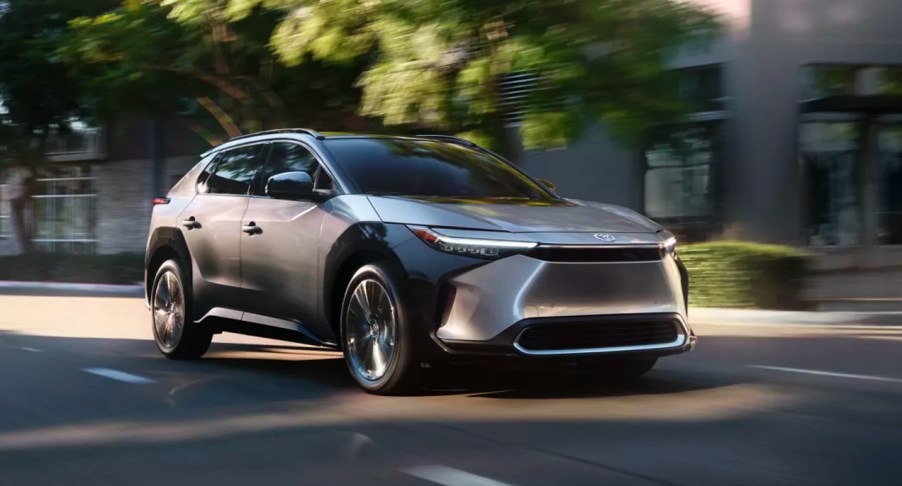
Should You Still Buy a Toyota bZ4X Without a Tax Credit?
Toyota is running out of federal electric vehicle tax credits. The Toyota bZ4X battery-electric SUV is finally here, but will consumers want the electric SUV?
Is the Toyota bZ4X worth the money?
The 2023 Toyota bZ4X is the cornerstone of Japanese automaker Toyota’s electric future. The automaker has already launched several successful hybrid and plug-in hybrid vehicles. The federal government allows each automaker to grant electric and plug-in hybrid buyers a tax incentive until a certain amount of sales have been reached.
After an automaker reaches that amount of sales, the tax incentive will gradually phase out. The industry is witnessing this process with Tesla vehicles. The total incentive amount decreases until vehicles are no longer eligible for any tax credit after reaching a sales threshold.
The government created this initiative to promote the sale of more sustainable vehicles by making them easier for automakers to sell and easier for consumers to buy. The bZ4X starts at $42,000. Consumers who receive the full $7,500 tax credit will pay closer to $34,500 (which is much more affordable). As an electric vehicle with moderate range, a great battery, and great standard tech, it’s a great deal when the full incentive is available.
The tricky part is the bZ4X’s price as the incentive is being phased out. Consumers will still save thousands before the automaker can no longer often any tax credit, but is the bZ4X worth it?
The tax credit is a chance to get the best version of the Toyota bZ4X
Sure, the tax credit makes the base model more affordable, but the real savings opportunity happens at the upper trim level. The bZ4X Limited AWD is the best version of the new electric SUV. When Toyota no longer offers a tax credit for the vehicle, its price will stand at $48,780.
This model comes with a Bird’s Eye View Camera with perimeter scan, heated and ventilated front seats, and SofTex-trimmed seats. It also includes wireless smartphone charging, a leather-trimmed steering wheel, ambient floor lighting, and a smart key system on front doors with push-button start.
After the full tax credit, consumers can grab the bZ4X Limited AWD for closer to $41,280 (now that’s a steal). The tax incentive allows average Americans to experience top-of-the-line features and purchase an EV packed with value for a bargain. Without the $7,500 federal electric vehicle tax credit, the bZ4X’s final trim level with all-wheel drive is much more expensive and thus less attainable for the average consumer. There truly isn’t a better time to buy a bZ4X Limited AWD.
Is buying a bZ4X without any tax incentive worth it?

Toyota’s electric SUV is much pricier than its gas-powered and hybrid SUV models. The bZ4X is roughly the same size as the Toyota RAV4, but it’s more expensive than the midsize Highlander. Very few automakers produce electric vehicles that are just as affordable as their gas-powered counterparts. The Hyundai Kona Electric is an affordable EV, but it’s much more expensive than gas-powered subcompact SUV models.
Consumers will eventually have to accept that electric vehicles cost more than gas-powered vehicles in many cases. So, is any electric vehicle worth the money without a tax incentive? That’s entirely up to the consumer, but losing thousands of dollars in savings could make the vehicle’s price less attractive.
If you want a Toyota bZ4X, now is the time to buy one. They’ll only get more expensive as the incentive phases out in the years to come. Learn how the bZ4X stacks up against the popular RAV4 in the next article.



